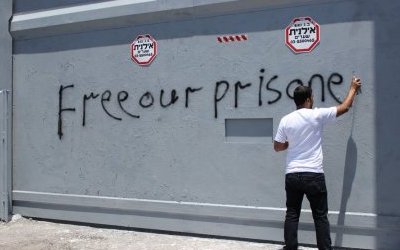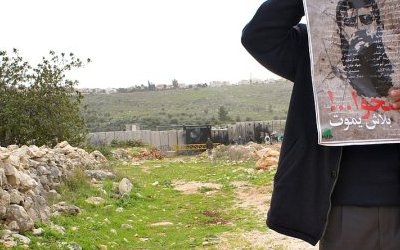


Le mouvement de grève de la faim contre la détention administrative s’amplifie
Addameer est une association défense des droits des prisonniers palestiniens. Dans un communiqué de presse, l’association revient sur le mouvement de grève de la faim menée par une centaine de prisonniers palestiniens incarcérés arbitrairement sous le régime de la détention administrative en Israël sans preuve ni jugement. L’association Addameer appelle à action : écrivez au gouvernement israélien et aux autorités administratives et militaires pour demander les prisonniers.
Mass hunger strike escalates as 30 prisoners join the fight for freedom from administrative detention
Occupied Ramallah, 13 May 2014 – Thirty Palestinian prisoners have joined the mass hunger strike this week, bringing the total number of hunger strikers to 125, including 90 administrative detainees. At the launch of the strike on 24 April 2014, the prisoner’s movement announced there would be a periodic escalation of the strike until their demand for the end of the policy of administrative detention is met. This recent escalation clearly represents the determination of the hunger strikers to follow through with the previously stated commitments.
Now, nearly three weeks into the hunger strike, the conditions and treatment of the hunger strikers are worsening and lawyers are being systematically denied access. In a clear attempt by the Israeli Prison Service (IPS) to break the strike Addameer lawyers have had great difficulty accessing the hunger strikers since the beginning of the strikes, either being denied entry to the prisons or having their visit abruptly interrupted by emergency alarms, forcing them to evacuate.
The IPS has used this same tactic of banning lawyer visits in the past as a way to isolate the hunger strikers from their right to legal counsel, as occurred during the 2012 mass hunger strikes when Addameer lawyers Anan Odeh and Samer Sima’an were banned from visiting their clients for six months
.
The hunger strikes are taking place across several prisons including Naqab, Ofer, Marash, Ayalon and the Ayala isolation cells. While the hunger strikers remain steadfast in their strike, their conditions have progressively worsened as the IPS regularly uses violent raids and searches of their cells ; mass transfers from one prison to another ; denial of water and salt ; and humiliating conditions to try to break their strike. Their punishment includes denial of family visits for four months, with some of the detainees being denied for six months ; no access to the yard ; and confiscation of newspapers or books for fourteen days.
Doctors Collaborating with the IPS
As reported earlier, the hunger strikers were denied salt and water for the first fifteen days of their strike, gravely putting their lives in danger. Despite the recent allowance of water and salt to some hunger strikers, their health is deteriorating rapidly after 19 days without food, with several of the strikers now saying they are experiencing severe dizziness.
Despite their dangerous health conditions, the hunger strikers are accusing the prison doctors of conspiring with the IPS to break their strike and have decided to boycott the prison clinics. For example, Mahmoud Shabaneh, who recently fainted as a result of the hunger-strike, was not taken to the prison clinic for three hours, and when he was, the doctors in the clinic tried to offer him food as a provocation. This behavior is in direct violation of the World Medical Association’s Malta Declaration on Hunger Strikers, which states that “Physicians or other health care personnel may not apply undue pressure of any sort on the hunger striker to suspend the strike.” While Israel is a signatory to the Malta Declaration, the clinical staff in the prisons are under the authority of the IPS and not of the Ministry of Health, meaning that they can function with impunity and continue to abuse the prisoners.
Systematic Violent Searches
The situation of the hunger strikers has intensified as they are frequently subjected to violent raids by IPS guards and Special Forces. There are daily individual searches, in which the hunger strikers are forced to be searched in a machine and then held in an overcrowded cage while handcuffed. Up to 48 hunger strikers have been held in the cage at once during the two hour searches.
The searches have also served as an opportunity for the guards to brutally attack the hunger strikers. In Ayala, for example, one elderly administrative detainee, Bahaa’ Al-Deen Ya’eesh was attacked, beaten and punched in the stomach and legs, in an attempt to force him off of his mattress. In Ayalon Prison, Mohammad Natsheh was attacked for requesting to take a bottle of water with him during a search. He was then transferred to the isolation section of Marash Prison and denied treatment for his injuries.
Dehumanizing Treatment and Conditions
Prisoners in Ayala isolation cells have reported to Addameer lawyers that two hunger strikers are held together in each of the in 2x3 meters cells. The size of these cells violates the IPS’s own regulations, which allot each prisoner 4.5 square meters. In a further attempt by the IPS to break the strike two leaders of the hunger strike committee in Ayala, Fadi Hammad and Soufian Wahadeen, have been transferred to solitary confinement.
The humiliating and degrading treatment seems to be encouraged by the IPS staff, as they prepare and eat their meals directly in front of the hunger strikers, even offering them food to try to provoke them and break their strike.
At the start of the hunger strikes, the detainee’s belongings were confiscated, except for the prison uniform they are wearing. They have only been allowed a change of undergarments twice in the past 19 days of hunger strike. The detainees are not allowed basic hygiene products, cleansers or soap. They complain of filthy, “unlivable” conditions, especially in the bathrooms. Due to their deteriorating health condition, the hunger strikers cannot climb to the top bunk bed in the cells, forcing them to move their mattresses to the ground.
The prisoners have attempted to raise their complaints against these circumstances with the IPS. Administrative detainee Mu’ayad Sharab attempted to file a complaint to the IPS. Instead of an investigation of their circumstances, he was taken to interrogation and investigated. The administration also refused to give Ya’eesh paper to file a complaint after he was beaten.
A Message from the Hunger Strikers to the Palestinian People
Despite the harrowing conditions, the hunger strikers remain steadfast in their quest for freedom and dignity. From Ayala Isolation Cells, they called for “the activation of solidarity campaigns, activities and demonstrations across Palestine to support the hunger strikers in their battle against the policy of administrative detention.”
Addameer fully supports the demands of the hunger strikers for the end of the policy of administrative detention. Israel’s use of administrative detention is abusive of the Fourth Geneva Convention, which stipulates that administrative detention can only be used for imperative reasons of security, after judicial review before an independent and impartial hearing with guarantees of a fair trial. (Article 78)
In light of the appalling abuse of the hunger strikers and the illegality of Israel’s use of administrative detention,
Addameer demands :
*The Palestinian Liberation Organization exercise its right as a signatory to the Geneva Conventions to request action by the High Contracting Parties, as is their responsibility according to the first article in the Geneva Conventions.
* The High Contracting Parties of the Geneva Convention respect its treaty and hold the Occupying forces accountable for the violations of its obligations as an Occupying Power as stipulated by the four Geneva Conventions.
* The United Nations Office of the High Commissioner of Human Rights intervene to save the lives of the hunger strikers and pressure the Occupying Power to respect its obligations under international humanitarian and human rights law.
* The World Health Organization open an immediate investigation of the practices and violations of the Israeli Prison Service doctors and physicians and their participation in punishing and abusing the hunger strikers.
* The International Committee of the Red Cross (ICRC) visit all hunger striking detainees and prisoners, as well as publicly condemn the policy of administrative detention which is in clear violation of the Fourth Geneva Convention, as stipulated by the ICRC mandate to protect international humanitarian law.
For more information please see Addameer’s recent administrative detention factsheet and visit www.stopadcampaign.com and http://www.addameer.org/
For latest development on the hunger strikes follow Addameer on Facebook and Twitter.
ACT NOW !
*Write to the Israeli government, military and legal authorities and demand the immediate release of the detainees and prisoners on hunger strike.
Brigadier General Danny Efroni
Military Judge Advocate General
6 David Elazar Street
Harkiya, Tel Aviv
Israel
Fax : +972 3 608 0366 ; +972 3 569 4526
Email : arbel@mail.idf.il ; avimn@idf.gov.il
Maj. Gen. Nitzan Alon
OC Central Command Nehemia Base, Central Command
Neveh Yaacov, Jerusalam
Fax : +972 2 530 5741
Minister of Defense Moshe Smilansky
Ministry of Defense
37 Kaplan Street, Hakirya
Tel Aviv 61909, Israel
Fax : +972 3 691 6940 / 696 2757
Col. Eli Bar On
Legal Advisor of Judea and Samaria PO Box 5
Beth El 90631
Fax : +972 2 9977326
Source : http://www.addameer.org/etemplate.php?id=682
Articles associés
 18 avril 2024
18 avril 2024Hôpital Al-Shifa, ventes militaires françaises et demande de cessez-le-feu Analyses politiques et géopolitiques Colonisation Eau Bande de Gaza Développement UE/Israël Politique française Jérusalem Autorité palestinienne Nations unies Torture et mauvais traitements Agriculture Etat de Palestine Droit international Solidarité internationale Enfance/jeunesse Histoire/analyse politique Santé Prisonniers palestiniens Vallée du Jourdain Destructions Aide internationale La question palestinienne en France Société (Palestine/Israël) Occupation/annexion Hamas Société civile Crime de guerre UE/Palestine Liberté d’expression Armement Violence des colons Climat/environnement Apartheid Guerre
Campagne en cours
Dernières publications
 31 mai 2024
Européennes : quels engagements des candidats pour la Palestine ?
La question palestinienne en France
UE/Palestine
31 mai 2024
Européennes : quels engagements des candidats pour la Palestine ?
La question palestinienne en France
UE/Palestine
 30 mai 2024
Rafah, blocus étudiants et écocide
Analyses politiques et géopolitiques
Colonisation
Eau
Bande de Gaza
Politique française
Jérusalem
Autorité palestinienne
Positions officielles de la France
Nations unies
Torture et mauvais traitements
Universités
Agriculture
Etat de Palestine
Droit international
Solidarité internationale
Enfance/jeunesse
Histoire/analyse politique
Culture / art
Réfugiés palestiniens
Destructions
Aide internationale
La question palestinienne en France
Occupation/annexion
Diplomatie
Hamas
Société civile
Transferts forcés
Crime de guerre
UE/Palestine
Société française
Liberté d’expression
Armement
Violence des colons
Cour Pénale Internationale
Criminalisation
Impunité
Climat/environnement
Apartheid
30 mai 2024
Rafah, blocus étudiants et écocide
Analyses politiques et géopolitiques
Colonisation
Eau
Bande de Gaza
Politique française
Jérusalem
Autorité palestinienne
Positions officielles de la France
Nations unies
Torture et mauvais traitements
Universités
Agriculture
Etat de Palestine
Droit international
Solidarité internationale
Enfance/jeunesse
Histoire/analyse politique
Culture / art
Réfugiés palestiniens
Destructions
Aide internationale
La question palestinienne en France
Occupation/annexion
Diplomatie
Hamas
Société civile
Transferts forcés
Crime de guerre
UE/Palestine
Société française
Liberté d’expression
Armement
Violence des colons
Cour Pénale Internationale
Criminalisation
Impunité
Climat/environnement
Apartheid
> Toutes les publications












